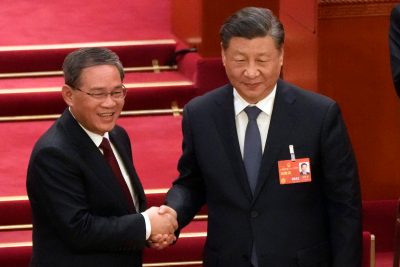Foreign investors trying to suss out when or whether to invest in China and condemned to rely upon the musings (one can’t call it reporting) of the Western establishment press on the National People’s Congress (NPC) that ended March 13 can be excused to be left bewildered by apparently contradictory policy signals.
What mainly creates the high degree of investor uncertainty is the insistence by Western commentators that the principal result of the 20th Chinese Communist Party Congress last October and the NPC is one-man rule and a cast of mindless “loyalists” – surely the most widely used and abused term regarding Chinese politics over the past six months.
So, let’s disentangle the messy picture. First, as I wrote last week, came the disappointing 5% economic growth target announced by outgoing premier Li Keqiang.
That, combined with President Xi Jinping’s statement at the congress outset that the US is leading its allies in “implementing all-round containment, encirclement and suppression” of China, confirmed the Western commentariat’s certain conclusion (with Bloomberg in the predictable lead) of the pre-20th Congress view and expectation of a now all-powerful Xi leading a statist command economy in war economy fashion – and to hell with private sector entrepreneurial initiative and say.
A March 14 speech by new and newly-empowered Foreign Minister Qin Gang saying that US-led containment and suppression under the pretext of national security could lead the US and China to conflict reinforced the view – as, oddly, did the announcement later in the week of several major administrative reforms reining in local governments’ debt creation ability and the establishment of a new powerful financial regulatory authority.
But then as the congress ended and as is traditional, new premier Li Qiang (same “strong Li” first and last name as his predecessor) stepped out before the press and for just a bit over an hour rather than the endless gabbing of his predecessor said this:
“I know that in recent years, some in the US have been trumpeting the idea of decoupling with China…but I wonder how many people can truly benefit from this kind of hype. China and the United States are closely intertwined economically. We have both benefited from the other side’s development.
“China and the US can and must cooperate. And there is a lot that the two countries can achieve by working together. Encirclement and suppression are in no one’s interest.”
And he added: “For a period of time last year, there were some incorrect discussions and comments in the society, which made some private entrepreneurs feel worried.
“From a new starting point, we will create a market-oriented, legalized and internationalized business environment, treat enterprises of all types of ownership equally, protect the property rights of enterprises and the rights and interests of entrepreneurs.”
We will “promote fair competition among various business entities, and support the development and growth of private enterprises.”
“The private sector will enjoy a better environment and broader space for development.”
Li Qiang’s elevation to the party’s most powerful seven-member Politburo Standing Committee at the congress in October came as a surprise to most people at home and abroad.

Isn’t that at least apparently in contradiction to the Xi/Qin tenor?
Western media and foreign investors should re-examine their premises. If Li is an unquestioning loyalist, then why did he – surprisingly (and as surprising as his CCP appointment as Xi’s number two in October) – strike a very different tone than Xi?
That Li is a long-time (two decades) loyal collaborator of Xi is a matter of record. What, in fact, is also a matter of record, is that Xi firmly believes in the efficacy of the private sector and the market economy in building a sound economy. It’s the premise of Xi the neo-Maoist that needs to be ditched.
The collaboration between Xi and Li Keqiang was never very good. Xi regarded (rightly, I think) Li Keqiang as a wet noodle when it came to execution. He has full confidence in Li Qiang’s executive competence. He will empower Li Qiang and trust that he will optimally execute.
It is unanimously reported by our sources that Li was instrumental in pushing for the abrupt end of the “zero-Covid” policy.
It was – again wrongly – “reported” (meaning surmised) by Western media that the newly created Financial Supervisory Authority will diminish Li’s power. The opposite is the case.
It will enhance it and take power away from in particular the China Securities Regulatory Commission, which Li successfully fought in drastically reforming the sclerotic Shanghai stock market.
So, what’s the upshot here?
China – both Xi and Li – sees itself in a make-or-break struggle to realize its development goals against the policies of denial initiated by Donald Trump and doubled down on by Joe Biden.
They will mobilize available national resources to achieve essential technology independence. But they will do so by relying on full empowerment of and support for the private sector.
I would advise the foreign investor to realize that any crash development program is costly and cuts into profits. China’s chips development program will have that short-term negative effect.
I also regard it as a certainty that the program will succeed and advise any value investor to make their choices accordingly. China’s development energies will not go away. Joe Biden’s desperate denial policies are unlikely to succeed.
This commentary first appeared in the Global Polarity Monitor newsletter. Follow Uwe Parpart on Twitter at @uwe_parpart

